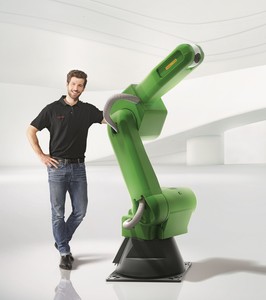
 |
Charlotte Stonestreet
Managing Editor |
There's always be a human (while there's a warehouse lane....)
15 May 2017
Last year, the World Economic Forum said that more than seven million jobs were at risk from advances in technology in the world’s largest economies over the next five years. The Bank of England’s chief economist, Andy Haldane, however, set out an even more concerning path. He said that up to 15 million jobs in Britain alone are at risk of being lost to robots.

A Chinese delivery warehouse in Hangzhou, Zhejiang province, recently hit the headlines after a mesmerising video of its little orange robots sorting parcels went viral. Showcasing these cushion-sized robots darting around the large warehouse at speed, it highlighted how close technology has come to performing tasks currently undertaken by human workers.
But Phil Chesworth, managing director at Midland Pallet Trucks, rebuffs the idea and underlines the importance of humans in the workplace. “While it’s true that robots can perform some tasks just as well as humans, relying on robots and technology for every aspect of a business could be detrimental. Simple, repetitive processes will usually provide a place for robots to shine, but when processes get more complex, this is where robots fall flat,” he says. “Unlike robots, humans can create, form relationships, and respond to out of the ordinary situations should one arise. Building relationships with suppliers and customers, and being able think on their feet is something only conscious humans can do.”
The lower the labour cost in an economy, the lower the incentive to automate, which may go some way to explaining the relatively low take-up of robotics in the UK. Even so, robots are starting to appear in unfamiliar surroundings, including agriculture and construction, where they may hold part of the answer to impending Brexit-related labour shortages. But they will do nothing to help the demographic imbalance in the UK, whereby a large, active younger workforce is needed to contribute taxes to fund the pensions of the older members of society.
Equally concerning is that Britain’s economy has shifted more towards low-skilled jobs and less towards high-skilled ones compared with other European countries, according to Oxford University research. The findings, which admittedly cover 1996-2008, show that the long-term pattern of jobs growth in the UK, as in most other European countries, has resembled an hourglass: the share of mid-skilled jobs such as secretaries and machine operators, has been squeezed by technology and globalisation, while the share of low-skilled jobs — for example, shop assistants — and high-skilled jobs, such as managers, has expanded.
But the research paper argues that process has played out differently in the UK than in many of its neighbours. For every 10 middle-skilled jobs that disappeared, about 4.5 of the replacement jobs were high-skilled and 5.5 were low-skilled. In Ireland, the balance was about eight high-skilled to two low-skilled, while in France and Germany it was about seven to three.
“In the replacement of those middle level jobs, the UK has shifted far more towards lower-skilled service work than lots of other European countries,” said the paper’s author Craig Holmes, who is an academic at Oxford and a research associate at the Centre on Skills, Knowledge and Organisational Performance.
The wealth creation of moving to robots may need to be dispersed in more innovative and equitable ways if our society is to be protected from the consequences of automation.
- No related articles listed



















